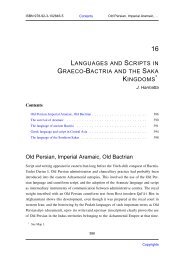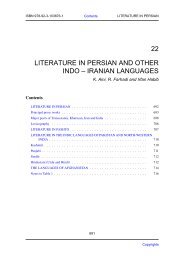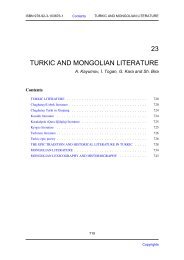1 Expanded version April 2013 - Unesco
1 Expanded version April 2013 - Unesco
1 Expanded version April 2013 - Unesco
You also want an ePaper? Increase the reach of your titles
YUMPU automatically turns print PDFs into web optimized ePapers that Google loves.
of implementation in the concerned communities; creating specific knowledge that will facilitate<br />
the implementation in the years to come.<br />
The monitoring strategy developed during the current year constituted an essential activity to track<br />
progress towards results. It targets both listeners and radio stations and, most importantly,<br />
involved local radio stations themselves for them to internalise the habit of seeking feedback. A<br />
primary evaluation by Field Officers suggests that there is an ongoing change of mindsets,<br />
especially on gender equality issues and on the role of local radios as social service providers.<br />
Correspondents’ role in local radios is of paramount importance for the achievement of results. To<br />
select and maintain a fruitful network of correspondents – avoiding high turnover – trainings were<br />
conducted both with the correspondents as well as with the radio station staff. The radio stations<br />
managers’ capacity for engaging and motivating current and new correspondents was assessed<br />
and improved. Outputs were created, such as contract models for volunteers and policies to<br />
recruit and motivate a correspondent network.<br />
The main challenges during the period under consideration related to identifying and working with<br />
quality local partners, availability of technical infrastructure in some radio stations, and dealing<br />
with unforeseen situations, produced by external factors, such as security concerns and staff<br />
incapacitation. Such issues are explored in the following report on item II with the corresponding<br />
actions taken and considerations for follow-up and improvement.<br />
For the sake of the project’s sustainability and further transition strategy, the focus to date has<br />
been on knowledge sharing and building capacity to manage processes, as opposed to simply<br />
concentrating on accomplishing actions. Efforts in this area included relying on the effective<br />
participation of the radio staff. By the time the project draws closer to its end point, the radio<br />
stations will have built the capacities to continue or replicate these actions, even without external<br />
assistance and outside of the project’s life span.<br />
Networking among radio staff proved to be an efficient way to stimulate discussion and improve<br />
learning. This aspect is being considered for training and building the envisaged online community<br />
of practice. A public visibility strategy is being implemented, integrating online actions and public<br />
relations interventions, and aimed at raising the project’s profile among governments, universities,<br />
research organizations, NGO’s and private companies.<br />
6






